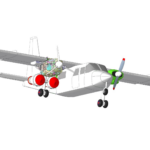Icelandair has selected Viasat’s inflight Wi-Fi solution for the airline’s new fleet of Airbus aircraft.
The new fleet is expected to service routes between Iceland and Europe as well as transatlantic flights, and is scheduled to begin delivery in Q4 CY 2024, marking the first Airbus aircraft to be operated by Icelandair.
To support Icelandair’s passenger experience goals, Viasat’s satellite connectivity service will be configured to provide a high-quality, fast online experience on all routes it serves, including streaming entertainment, and real-time productivity tools, keeping passengers and crew connected throughout the flight.
While providing fast in-flight connectivity across popular flight corridors and busy airport hubs, Icelandair will benefit from Viasat’s focus on serving the aviation market – which it does through a combination of high throughput satellite capacity and the ability to flex that capacity, to meet demand where it peaks and is most concentrated.
Thanks to this, together Viasat and Icelandair can provide a consistently high quality, high-speed, and content-rich in-flight Wi-Fi experience, even during times of intense demand.
“For several years now, we have enjoyed a great partnership with Icelandair while servicing its complete Boeing 737 MAX fleet,” said Don Buchman, VP and GM, Commercial Aviation at Viasat. “We understand the patterns of Icelandair’s operation and passenger demand for in-flight Wi-Fi, and we are excited to extend this experience and trust to include fast and resilient connectivity on the new Airbus aircraft.”
“By expanding our high-speed streaming Wi-Fi offering to the new aircraft, we are doubling down on the state-of-the-art connectivity that has become a highly sought-after element of the Icelandair passenger experience,” said Helga Huld Bjarnadóttir, Director Product and Service Management, Icelandair.
“Viasat has proven to be an innovative and trusted partner for how we approach the future of Wi-Fi at Icelandair, and we look forward to continuing this into the future.”
Subscribe to the FINN weekly newsletter

